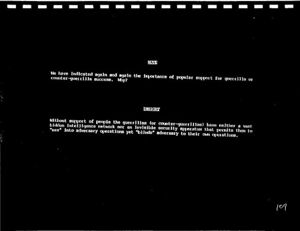Patterns of Conflict
| The works of |
| Works of John Boyd |
|---|
OODA WIKI Edition
Quantico Transcription
Remember, we said importance of popular support, and the reason was because that's a lot of basis for your intelligence. In other words, in a sense, when you get the people on your side, the government is blind. Or if you're the government, you can get them sucked away from the guerrillas and the guerrillas will become blind, they don’t know what’s going on. Just don't think of formal intelligence operations associated with the military. The people are going to give you enormous intelligence, if you exploit it and take advantage of it.
[05:00] In fact, there was an interesting case during World War II, which got me on to this, to see that so beautifully. I saw it. Really get inside and get the fingerspitzengefühl for it. I can't remember what book I read it in, but it was very interesting story. It was an historical account of an American advisor. I believe— it might have been a Marine, I'm not sure. But with the Chinese communists, 8th Group Army over in China, either prior or during World War II. I think it was prior to World War II.
And they were going against the Chinese Nationalists. No, it was against the Japanese at that time. And it's really interesting. So the communist commander said, “I want you to look at my operation and critique it so you can tell me what I’m doing wrong.” The advisor has free access, he came back and says, Jesus Christ, you know, no patrols, no recce, you know, that's bullshit. You've got to get those guys out there. And the communist commander just smiled. He says, no we don't need that recce. The guy says why not? He says, we get all the people out there, they’re all recce, we know exactly what those other people are doing. That was his intelligence, recce, all the people. He said, I don’t have to use my troops for that. We got it all, all those people are doing it. That means they really understood the intelligence/recce operation. They got all kinds of things [unintelligible]. The guy goes, that's really interesting.
Very important. I'm not saying you should dispense with it, but he's trying to make a point, he had that. Okay, let's get into categories of conflict.
